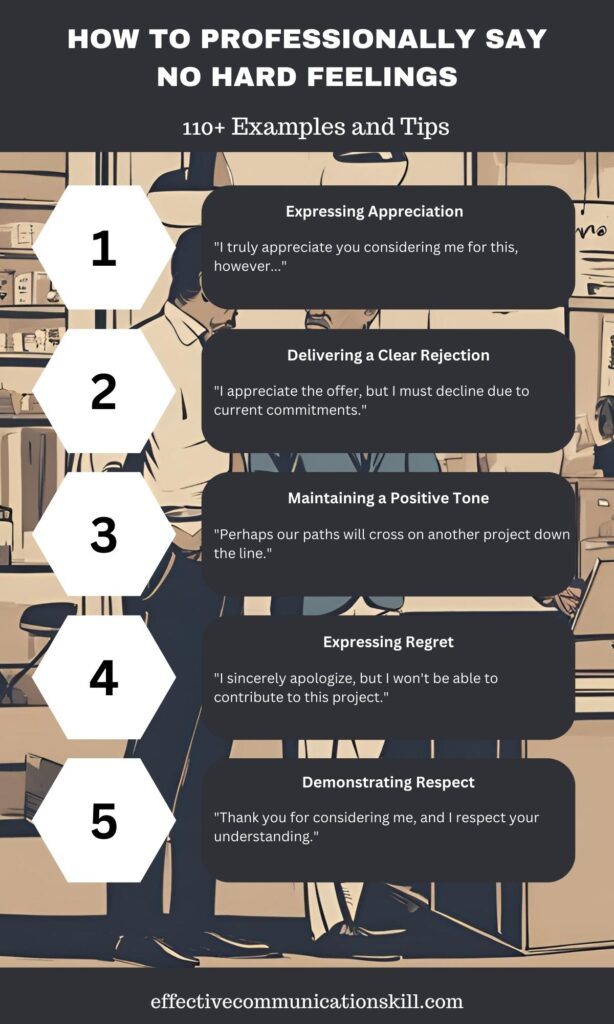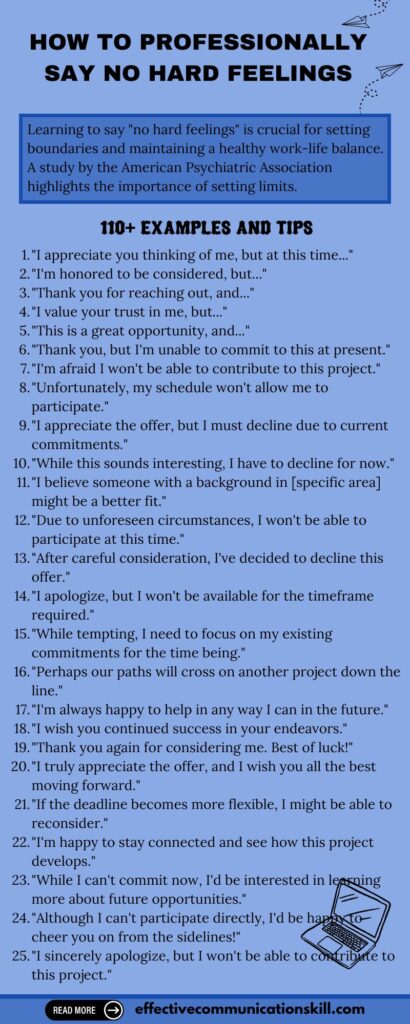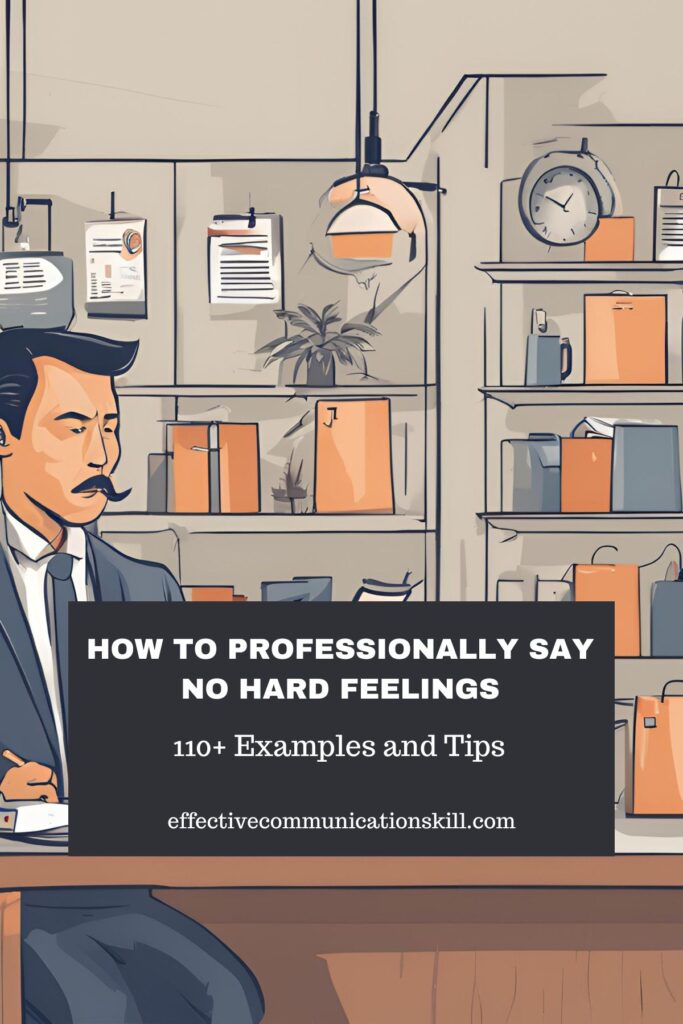How to Professionally Say No Hard Feelings
In the age of instant connection and constant communication, the art of saying “no” gracefully can feel like a lost relic.
Learning to say “no hard feelings” is crucial for setting boundaries and maintaining a healthy work-life balance. A study by the American Psychiatric Association highlights the importance of setting limits and learning to say “no” in order to maintain self-care and avoid overcommitment
How to Say No Without Saying No Professionally – But what if there was a way to navigate this conundrum? Enter the power of the positive “no.” This approach equips you with effective communication strategies to politely decline requests while preserving goodwill and fostering a culture of respect.
This post delves into the world of professional boundaries, offering practical tips and versatile phrases to ensure that saying “no” empowers you, not hinders you.

How to Professionally Say No Hard Feelings?
Turning down a request doesn’t have to be awkward. Here are key strategies to ensure your message lands smoothly and tips to say no hard feelings professionally:
- Express Appreciation: Acknowledge the offer and show gratitude for being considered.
Example: “Thank you for thinking of me for this project…”
- Be Clear and Direct: State your decision upfront, avoiding ambiguity.
Example: “…however, I won’t be able to take it on at this time.”
- Offer a Brief Explanation (Optional): Provide a concise reason for declining, if appropriate.
Example: “Due to my current workload…”
- Maintain a Positive Tone: End on a positive note, leaving the door open for future collaboration.
Example: “…I wish you the best of luck with it. Please keep me in mind for future opportunities.”
- Offer Alternatives (Optional): If possible, suggest someone else who might be suitable.
Example: “Perhaps [colleague’s name] might be a good fit for this project.”
100+ Professional ways to say No Hard Feelings
Here’s a list of various phrases categorized by tone and intent, allowing you to say No hard feelings professionally for different scenarios:
Expressing Appreciation
- “Thank you for the invitation, but…”
- “I truly appreciate you considering me for this, however…”
- “I’m grateful for the opportunity, but…”
- “Your offer is very kind, and…”
- “Thank you for including me, unfortunately…”
- “I appreciate you thinking of me, but at this time…”
- “I’m honored to be considered, but…”
- “Thank you for reaching out, and…”
- “I value your trust in me, but…”
- “This is a great opportunity, and…”
- “I appreciate your confidence in my abilities, but…”
Delivering a Clear Rejection
- “I won’t be able to participate in this project.”
- “Unfortunately, I must decline your offer.”
- “Regretfully, I have to say no at this time.”
- “I appreciate it, but I have to pass on this opportunity.”
- “While this is tempting, I need to decline.”
- “As much as I’d like to, I can’t take this on right now.”
- “Thank you, but I’m unable to commit to this at present.”
- “I’m afraid I won’t be able to contribute to this project.”
- “Unfortunately, my schedule won’t allow me to participate.”
- “I appreciate the offer, but I must decline due to current commitments.”
- “While this sounds interesting, I have to decline for now.”
Offering a Brief Explanation (Optional)
- “Due to my current workload…”
- “Unfortunately, I have other commitments that prevent me from taking this on right now.”
- “With my current deadlines, I wouldn’t be able to give this project the attention it deserves.”
- “I’m currently focusing on [other project], so I wouldn’t be able to dedicate the necessary time.”
- “While this is interesting, it doesn’t quite align with my current priorities.”
- “Unfortunately, my skillset isn’t the best fit for this particular project.”
- “I believe someone with a background in [specific area] might be a better fit.”
- “Due to unforeseen circumstances, I won’t be able to participate at this time.”
- “After careful consideration, I’ve decided to decline this offer.”
- “I apologize, but I won’t be available for the timeframe required.”
- “While tempting, I need to focus on my existing commitments for the time being.”
Maintaining a Positive Tone
- “I wish you the best of luck with this project.”
- “I’m confident you’ll find the right person for the job.”
- “Please don’t hesitate to reach out if anything changes in the future.”
- “I look forward to collaborating on future opportunities.”
- “It was a pleasure connecting, and I wish you all the best.”
- “I truly appreciate you keeping me in mind.”
- “Perhaps our paths will cross on another project down the line.”
- “I’m always happy to help in any way I can in the future.”
- “I wish you continued success in your endeavors.”
- “Thank you again for considering me. Best of luck!”
- “I truly appreciate the offer, and I wish you all the best moving forward.”
Offering Alternatives (Optional)
- “Perhaps [colleague’s name] might be a good fit for this project.”
- “I’d be happy to recommend someone else who might be interested.”
- “If the requirements change in the future, I’d be happy to revisit the opportunity.”
- “While I can’t commit now, please keep me posted on future projects.”
- “I’m happy to offer my feedback or guidance if needed.”
- “Let me know if there’s another way I can contribute to this project.”
- “While I can’t participate directly, I can connect you with someone who might be able to help.”
- “If the deadline becomes more flexible, I might be able to reconsider.”
- “I’m happy to stay connected and see how this project develops.”
- “While I can’t commit now, I’d be interested in learning more about future opportunities.”
- “Although I can’t participate directly, I’d be happy to cheer you on from the sidelines!”
Expressing Regret
- “I’m truly sorry, but I won’t be able to participate.”
- “I regret to inform you that I must decline your offer.”
- “Unfortunately, I have to say no, and I apologize for any inconvenience.”
- “I wish things were different, but I have to decline this opportunity.”
- “It’s with regret that I must pass on this project.”
- “I’m disappointed to decline, but my schedule won’t allow for it.”
- “I apologize, but I can’t commit to this at the present time.”
- “While this is a great opportunity, I regret that I have to decline.”
- “I’m truly sorry, but unforeseen circumstances prevent me from participating.”
- “I sincerely apologize, but I won’t be able to contribute to this project.”
- “With regret, I must decline your offer. I wish you the best in finding someone suitable.”
Emphasizing Future Collaboration
- “I’d be happy to collaborate on future projects that align with my availability.”
- “Please keep me in mind for any future opportunities that might be a good fit.”
- “I’m always interested in exploring new opportunities in the future.”
- “While I can’t participate now, I’m open to collaborating down the line.”
- “I look forward to staying connected and working together on future endeavors.”
- “Perhaps our paths will cross on another project that aligns with my current commitments.”
- “While I can’t contribute directly this time, I’m always happy to help in any way I can for future projects.”
- “I’m excited to see what the future holds, and perhaps we can collaborate then.”
- “Although I can’t participate now, I’d love to be kept in the loop about future opportunities.”
- “I believe in the importance of this project, and I’d be happy to support it in any way possible in the future.”
- “While my schedule is full right now, I’m always open to exploring future collaborations.”
Demonstrating Respect
- “I appreciate you understanding my position.”
- “Thank you for considering me, and I respect your understanding.”
- “I value your offer, and I apologize for any inconvenience caused by my decline.”
- “Thank you for reaching out, and I respect your decision if you need to move forward with someone else.”
- “I understand this is important, and I appreciate you offering me the opportunity.”
- “I respect your project timeline, and I wouldn’t want to hold you back.”
- “Thank you for your time and consideration. I completely understand.”
- “Despite my decline, I wish you the best of luck in finding the right person for the job.”
- “I appreciate your understanding, and I respect the importance of your project.”
- “Thank you for the opportunity, and I respect your need to find someone who can fully commit.”
- “While I can’t participate, I respect your project and its goals.”

Conveying Confidence
- “I’m confident you’ll find the perfect person for this project.”
- “I have no doubt you’ll find someone who can contribute significantly.”
- “I’m sure you’ll make a great choice, and I wish you all the best in your search.”
- “With your team’s talent, I’m confident this project will be a success.”
- “There are many qualified individuals who would be a great fit for this opportunity.”
- “I’m sure you’ll find someone who can dedicate the necessary time and attention.”
- “Based on your project description, I believe you’ll find the right person to excel in this role.”
- “I have no doubt you’ll assemble a strong team to bring this project to fruition.”
- “Your confidence in my abilities is appreciated, and I’m confident you’ll find the best fit for the project.”
- “While I can’t contribute directly, I’m confident this project will be a success with the right team in place.”
- “I trust your judgment in finding the perfect person to contribute to this project.”
Acknowledging Limitations
- “I recognize that this is a valuable opportunity, but unfortunately, it doesn’t align with my current skillset.”
- “I understand the importance of this project, but I wouldn’t be able to deliver the quality work it deserves with my current workload.”
- “While I’m interested in the project, I believe my time would be better spent focusing on my existing commitments.”
- “I appreciate the offer, but I wouldn’t want to take on a role where I couldn’t fully contribute my abilities.”
- “It sounds like a great project, but I’m afraid I lack the specific experience required for this particular role.”
- “I’m always looking to expand my skillset, but this project is beyond my current capabilities.”
- “While I’m eager to take on new challenges, I wouldn’t want to take on something I couldn’t excel at due to time constraints.”
- “I respect the project’s goals, and I recognize that I wouldn’t be able to meet the high standards required at this time.”
- “Thank you for considering me, but I believe there are others who would be a better fit with the specific requirements of this project.”
- “I appreciate the opportunity to learn more, but honesty compels me to decline due to my limitations.”
- “While I’m always interested in growth, I wouldn’t want to take on a role that wouldn’t allow me to deliver my best work.”
Examples in Action
Here are some scenarios demonstrating how to effectively decline a request while maintaining professionalism:
Scenario 1: Overloaded Schedule
Subject: Re: Committee Participation
Dear Sarah,
Thank you for inviting me to join the marketing committee. I appreciate your confidence in my abilities. Unfortunately, due to my current workload with [mention ongoing projects], I wouldn’t be able to dedicate the time and attention this committee deserves.
I’d be happy to recommend [colleague’s name] who might be a great fit for the committee. Please don’t hesitate to reach out if you have any questions.
Best regards,
[Your Name]
Scenario 2: Skillset Mismatch
Subject: Re: Design Project Offer
Dear Mr. Jones,
Thank you for considering me for the [project name] design project. I appreciate the opportunity.
After reviewing the project details, I believe my expertise might not be the best fit for this particular style. The project seems to require a strong background in [specific design area], which falls outside my current skillset.
I can, however, recommend some talented designers in my network who might be a better match for this project. Please let me know if you’d be interested in a referral.
Thank you again for your time and consideration.
Sincerely,
[Your Name]
Scenario 3: Regretful Decline
Subject: Re: Meeting Invitation
Dear Michael,
Thank you for inviting me to the brainstorming session for the new product launch. I’m truly sorry, but I won’t be able to attend due to a prior commitment that can’t be rescheduled.
I’m genuinely interested in this project and would love to be kept in the loop on the team’s progress. Perhaps I can contribute remotely or participate in future discussions.
I apologize for any inconvenience caused by my absence. I wish you all the best for a successful brainstorming session.
Best regards,
[Your Name]
Scenario 4: Conflicting Priorities
Subject: Re: Collaboration Request
Dear [Name],
Thank you for reaching out about collaborating on your [project name] project. It sounds fascinating, and I truly appreciate the invitation.
Unfortunately, due to my current priorities with [mention ongoing projects], I wouldn’t be able to dedicate the time and effort this collaboration deserves.
I’m following your work with great interest, and perhaps our paths will cross on a future project that better aligns with my current commitments. In the meantime, I wish you all the best in your endeavors!
Best regards,
[Your Name]
Scenario 5: Lack of Resources
Subject: Re: Request for Departmental Support
Dear [Name],
Thank you for reaching out for support with your [project name] project. I understand the importance of this initiative, and I truly appreciate you considering our department.
Unfortunately, due to limited resources and staffing constraints within our department at this time, we wouldn’t be able to provide the level of support your project requires.
I’d be happy to connect you with some colleagues in other departments who might have the capacity to assist. Please let me know if that would be helpful.
Best regards,
[Your Name]
Scenario 6: Needing More Information
Subject: Re: Project Proposal
Dear [Name],
Thank you for sending over the project proposal for [project name]. I appreciate you keeping me informed.
After reviewing the proposal, I have a few questions to clarify the scope and timeline of the project. Would you be available for a quick call to discuss these details further?
Depending on the additional information, I can then provide a more definitive answer regarding my participation.
Thank you for your understanding.
Best regards,
[Your Name]
Scenario 7: Ethical Concerns
Subject: Re: Business Proposal
Dear [Name],
Thank you for presenting me with the opportunity to partner with your company on the [project name] project. I appreciate you considering me.
After careful consideration, I’ve decided to decline your offer. While the project itself seems interesting, I have some ethical concerns regarding [mention specific concern].
I wish you all the best in finding a suitable partner for this project.
Sincerely,
[Your Name]
Scenario 8: Alternative Suggestion
Subject: Re: Meeting Request
Dear [Name],
Thank you for inviting me to the meeting on [topic]. Unfortunately, I won’t be able to attend due to a scheduling conflict.
However, I’d be happy to provide a brief written summary of my thoughts on the topic beforehand. Would this be helpful for the discussion?
Alternatively, if possible, could you share the meeting minutes or key takeaways afterwards?
Thank you for your understanding.
Best regards,
[Your Name]

Conclusion
Mastering the art of professionally declining a request is a valuable skill in any work environment. By incorporating the diverse range of phrases and approaches provided in this post, you can confidently decline requests while maintaining a respectful and professional tone.
Remember, clear communication and a genuine focus on maintaining positive connections are key. So next time you need to decline an offer or opportunity, leverage the power of a well-crafted “no hard feelings” message, and watch your professional relationships flourish.
